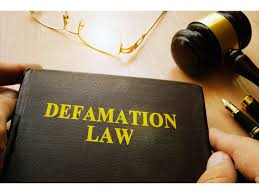Olayiwola Oshunrinade
The law of defamation in Nigeria is rooted in both common law principles and statutory provisions. It protects individuals and entities from false statements that harm their reputation. The Nigerian courts have handled several defamation cases, balancing the rights to freedom of speech with the need to protect reputations.
What Is Defamation?
Defamation involves the publication of a false statement that injures the reputation of an individual or entity. In Nigeria, defamation is categorized into two types:
Libel: Defamation in a permanent form, such as written or published statements in newspapers, books, or online platforms.
Slander: Defamation in a transient form, such as spoken words or gestures.
For a statement to qualify as defamatory, it must:
Be false.
Be published or communicated to a third party.
Lower the victim’s reputation in the estimation of right-thinking members of society.
Legal Framework for Defamation in Nigeria
Common Law Principles:
Nigerian courts rely heavily on common law precedents in handling defamation cases. These principles determine the elements of defamation and how claims are adjudicated.
Constitutional Provisions:
The 1999 Constitution of Nigeria guarantees the right to freedom of expression under Section 39. However, this right is not absolute and must be exercised without infringing on the rights of others, including their reputation.
Criminal Code and Penal Code:
Under the Criminal Code Act, applicable in the southern part of Nigeria, defamation can be a criminal offense punishable by imprisonment under Sections 373–381.
The Penal Code, applicable in the northern part of Nigeria, also criminalizes defamation under Sections 391–395.
Defamation and Libel Law under Torts:
Defamation is also a tort in Nigeria, allowing individuals to seek civil remedies, including damages for injury to their reputation.
Elements of Defamation
To succeed in a defamation claim, the plaintiff must prove the following:
Publication: The defamatory statement must have been communicated to at least one person other than the victim.
Falsity: The statement must be untrue. Truth is an absolute defense to defamation.
Injury to Reputation: The statement must harm the reputation of the claimant, subjecting them to public ridicule, hatred, or contempt.
Identification: The statement must refer to the plaintiff directly or indirectly.
Fault: The defendant must have acted negligently or with malice in publishing the statement.
Defenses to Defamation
Truth/Justification: If the statement is true, it cannot be defamatory, regardless of its impact on the plaintiff’s reputation.
Fair Comment: A statement made as an opinion, rather than a fact, on a matter of public interest is not defamatory if it is fair.
Privilege: Statements made in certain contexts, such as parliamentary proceedings, court proceedings, or under qualified privilege (e.g., employment references), may be protected.
Consent: If the plaintiff consented to the publication of the statement, they cannot claim defamation.
Civil Remedies for Defamation
A plaintiff in a civil defamation case can seek:
Damages: Monetary compensation for injury to reputation.
Injunction: A court order preventing further publication of the defamatory statement.
Criminal Defamation
In criminal defamation cases, the prosecution must prove:
The accused published the defamatory statement.
The publication was intended to harm the reputation of the victim.
Punishments under criminal law may include fines or imprisonment.
Recent Trends and Challenges
Social Media and Defamation:
The rise of social media has complicated defamation law, with individuals now able to reach large audiences instantly. Nigerian courts have started handling cases involving online defamation, emphasizing that digital platforms are not exempt from defamation laws.
Balancing Freedom of Speech:
Courts often face challenges in balancing constitutional freedom of expression with the need to protect reputations.
High Costs of Litigation:
Many Nigerians cannot afford the high legal costs associated with defamation cases, limiting access to justice.
Conclusion
The law of defamation in Nigeria serves as a vital tool to protect reputations while balancing freedom of speech. As society evolves and technology advances, it is crucial for Nigerian lawmakers and courts to adapt the legal framework to address new challenges, ensuring that justice is served in both traditional and modern contexts.








